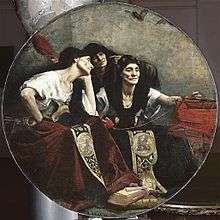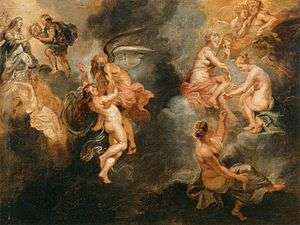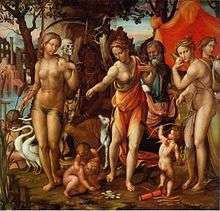Nona (mythology)
Nona was one of the Parcae, the three personifications of destiny in Roman mythology (the Moirai in Greek mythology and in Germanic mythology, the Norns), and the Roman goddess of pregnancy. The Roman equivalent of the Greek Clotho, she spun the thread of life from her distaff onto her spindle. Nona, whose name means "ninth", was called upon by pregnant women in their ninth month when the child was due to be born.[1][2]

Les Parques ("The Parcæ"), Alfred Agache, c 1885

The Triumph of Truth (The Three Parcae Spinning the Fate of Marie de Medici) (1622-1625), by Peter Paul Rubens (1577-1640)
She, Decima and Morta together controlled the metaphorical thread of life.

The Three Parcae (1540-1550), by Marco Bigio, in Villa Barberini, Rome
Note
- The Attic Nights of Aulus Gellius; Translated into English by the Rev. W. Beloe, F.S.R., Translator of Herodotus. I. London: Printed for J.Johnson, St. Paul Church-Yard. 1795. p. 220. Retrieved 9 January 2018 – via Internet Archive.
- "Tertullian, A Treatise On the Soul". The Ante-Nicene Fathers; Translations of the Fathers Down to A.D., The Rev. Alexander Roberts, D.D., James Donaldson, LL.D. Editors. III. Grand Rapids, Michigan: WM EERDMANS Publishing Company. 1986. p. 217. Retrieved 11 January 2018 – via Internet Archive.
gollark: Maybe it should only involve a ban from the counting channel.
gollark: I suppose you could do logarithm of the difference too. Or possibly some kind of by-digit difference metric. Or Levenshtein distance.
gollark: Or equal to the difference between the correct number and what you said.
gollark: I'm not entirely sure to be honest.
gollark: As I said, the text in <#471334670483849216> about cultists was there before IIRC.
References
- Gellius, Aulus. Noctes Atticae, III, 16.
- Tertullian. De Anima, 37.
This article is issued from Wikipedia. The text is licensed under Creative Commons - Attribution - Sharealike. Additional terms may apply for the media files.